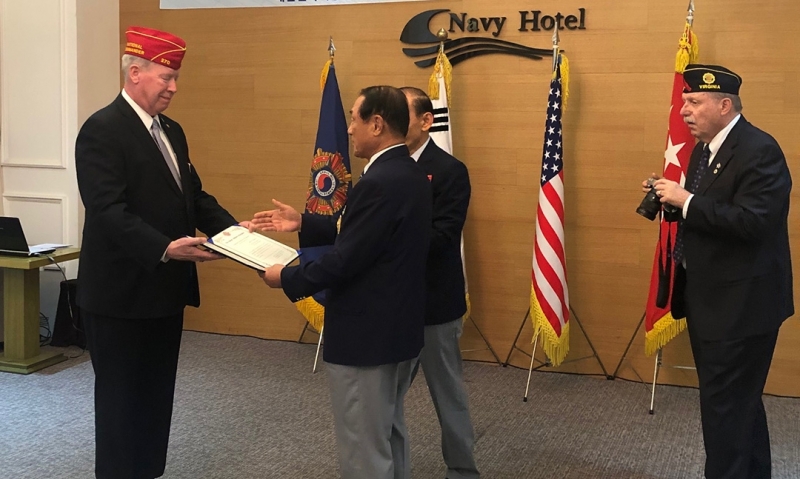
Military missions, alliance dominate commander’s visit to Korea
Like the signature quote from the movie "Top Gun," pilots at Osan Air Base helped satisfy a “need for speed,” during American Legion National Commander Brett Reistad’s visit to South Korea this week.
As a passenger in a U-2 “chase car,” Reistad couldn’t be blamed if he recalled some his days as a police officer while he and the rest of his delegation topped 100 miles per hour while driving behind a famed spy plane racing down the runway as it left to soar to the edges of the stratosphere. A journey that would give the pilot “the best view on the planet earth,” according to Air Force Maj. Stephen Bailey.
“It is amazing to see the teamwork and the communication required to fly these aircraft,” Reistad said after meeting with the 5th Reconnaissance “Blackcats” Squadron. “The responsibility that our military forces have not just in Korea, but the entire Pacific region cannot be overstated. The briefings and meetings we have had with senior military officials from Indo-Pacific Command in Hawaii, Camp Humphreys, Korea and our upcoming visit to Japan will help The American Legion deliver an informed message to Congress regarding the needs of those who defend our freedom every day. This knowledge is best obtained by visiting the regions and seeing it firsthand.”
That firsthand experience included time in an A-10 simulator, courtesy of Osan’s 51st Fighter Wing. “As an infantry sergeant this is not a drill that I was able to experience during my military service,” Reistad said. “But again, this demonstrates the wide range of skills that make the total team concept of our military work. The equipment, as it should be, is state of the art. Congress needs to continue to fund our military so we can keep producing the best pilots, tankers, infantry, sea crews, intelligence and support personnel in the world.”
The U.S-Republic of Korea alliance was another topic that kept surfacing during Reistad’s visit to the country.
During a formal dinner hosted by the Korean Veterans Association (KVA), The American Legion delegation met the KVA’s top leadership including the organization’s chairman, retired Gen. Kim Jin Ho. Kim served as South Korea’s 28th Joint Chiefs of Staff Chairman.
The KVA has more than 10 million members and has so far raised $200,000 to erect a wall bearing the names of fallen American veterans of the Korean War to be added to the existing war memorial in Washington, D.C.
But it was recent negotiations involving North Korean denuclearization which dominated the dinner discussion.
When asked by American Legion Executive Director Lou Celli about the impact the cancellation of large U.S. military exercises was having on the negotiations, Kim was somewhat optimistic.
“Even if an exercise is cancelled, we still have many training opportunities together,” Kim said. “It is not a big issue anymore. We understand.”
As Reistad departed Korea for Okinawa, he added that he was not just impressed with the strength of the alliance and the relationship between The American Legion and the KVA, but also the growing local American Legion presence in South Korea.
“Five years ago, there were no American Legion posts in Korea. Now we have Posts 37 and Post 38. One post officer made a strong personal commitment to us that he will build additional posts here to make our presence even greater,” Reistad said. “That is the type of dedication and commitment we need not just in Korea, but throughout the entire American Legion world.”
